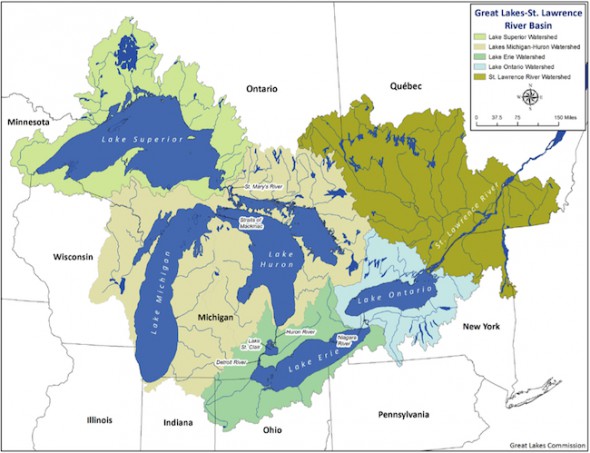Why Waukesha Water Bid Should Be Okayed
The proposal complies with the law, but environmentalists won’t give up their opposition.
The water drama that has become “Waukesha” is nearing an end.
Great Lakes governors are slated to vote on the Wisconsin city’s request for Lake Michigan water on June 21st in Chicago.
The table was set to approve that request last month when an advisory group designated by the governors and Canadian premiers finished a protracted and rigorous review of Waukesha’s request.
They attached a couple of important conditions to the request, which Wisconsin accepted, then voted 9-0 to recommend approval. A dawdling Minnesota abstained.
That should be it.
The goal is to “provide a long term solution for Waukesha’s residents” and be true to the letter and spirit of the compact, New York’s Don Selazny told me at a meeting of the regional representatives. Selazny is one of the group that voted in favor of Waukesha’s request.
The compact is the landmark agreement between the eight states designed to keep water in the basin and govern the few diversions it may allow.
A yes vote by the governors should be a fait accompli if reliance on facts, the law and logic is the basis for a decision.
But some folks aren’t happy with the way things appear to be headed.
While they compromised in 2008 by supporting the compact they are unwilling to compromise now.
Thus the drama.
A coalition of environmental groups is “disappointed” that the governors and premiers group didn’t “completely reject Waukesha’s flawed diversion proposal.”
The regional group of U.S. and Canadian mayors opposes the diversion too. In a statement on its website, the Great Lakes and St. Lawrence Cities Initiative says it fears approving a Waukesha diversion would “become the door through which Great Lakes water is taken away and sold to many regions of this country, or even abroad.”
There’s more.
Two Michigan members of the U.S. House of Representatives – Democrat Debbie Dingell and Republican Candice Miller — recently wrote to Michigan Gov. Rick Snyder urging him vote no on Waukesha’s request.
They called it “an attempt to pillage our magnificent Lakes” and asked him to “do the right thing.”
“Pillage” sounds like a Waukesha approval would permit hordes of water-sucking tankers from Arizona to advance on Lake Michigan, like there’s a pipeline to California attached to Lake Superior waiting to be switched on.
Reps. Dingell and Miller should spare us the ill-informed hyperbole and drop the drama.
Cheap political pandering on an issue where they have demonstrated little expertise and have no legislative responsibility is not needed and denigrates the hard work the states have done. In fact, the states decided on an interstate compact as the governing document specifically to keep diversion issues out of the control of the D.C. politicians.
Miller voted in 2008 to approve the compact. Debbie Dingell was not in the House in 2008. Neither Dingell or Miller have a vote on Waukesha’s request.
The Great Lakes region has an opportunity to demonstrate what good water governance looks like by approving Waukesha’s request.
As unpopular as it may be on an emotional level – no one wants Great Lakes water to leave even when it’s treated and returned – Waukesha’s request complies with the law.
That’s the law based on the agreement signed in 2005 by eight bi-partisan Great Lakes governors and accompanied by a similar law in Canada. It’s the law easily passed by Congress and signed by the president in 2008.
It is the same law that was enthusiastically supported by environmental groups and business interests and heralded as proof of the value of regional collaboration. It is the law that fueled countless celebrating success victory laps at conferences.
I suspect there will be last minute pressure on the governors to nix the Waukesha request; witness the Dingell / Miller letter.
There’s still time for the region to snatch defeat from the jaws of victory.
That would be a mistake.
The rigorous work to make sure Waukesha’s request is compact-compliant has been done and it is.
Waukesha is a mere puddle of an issue to take a stand on compared to other Great Lakes problems such as the disasters of Lake Erie water quality and the Flint water crisis.
The anti-Waukesha crowd should channel its resources in issues like those, not in trying to deny an unsympathetic but needy suburb basic drinking water.
It’s time to tell the governors to approve Waukesha’s request, declare victory and move on.
Gary Wilson is a commentator for Great Lakes Echo where this column first appeared.
Op-Ed
-
Why Vote for MPS Funding Referendum
 Mar 30th, 2024 by Nehemiah Edwards
Mar 30th, 2024 by Nehemiah Edwards
-
Wisconsin’s Very Own Rudy Giuliani Should Not Oversee Judicial Ethics
 Mar 25th, 2024 by Richard Niess
Mar 25th, 2024 by Richard Niess
-
Voting at Wisconsin’s Universities Isn’t Easy
 Mar 17th, 2024 by Nicole Laudolff
Mar 17th, 2024 by Nicole Laudolff
















Suburban legislators want to build a wall around Milwaukee. That racist sediment is enough to deny water access.
Johnny is right. We should totally base our water policies on whether or not we like our neighbors’ politicians or not.
Sorry, Waukesha. If you turn more liberal, give us a call back, we’ll see what we can do. Otherwise, enjoy that radium.
I was prepared to change my rather vague opposition to the Waukesha water bid when I began to read this article, partly because my opposition WAS rather vague and, therefor fungible. I had insufficient information to make a well-grounded critique either of the Waukesha bid itself or of the opposition to it, particularly that of the Michigan representatives.
Unfortunately, the article gave me no solid information about the proposal, why it was a good thing for the Great Lakes, or why, specifically, the opposition is unfounded or misguided. Instead, I read about how the members of the Great Lakes advisory group and the governors of the affected states were unanimous (except for Minnesota’s abstention) in their support of the Waukesha. Why were they? What were their reasons for being unanimous, and why were they good ones? Representative Dingell and Miller’s arguments needed to be refuted, not merely characterized ad hominem or called out for the use of the word “pillage?” Was the worry that, once a precedent was set for out-of-watershed use of Great Lakes water, the floodgates (sorry!) of distant users would begin? On its face, such a concern would not seem unwarranted; what measures were in place to prevent this? Mr. Miller tells us that there was “rigorous work to make sure Waukesha’s request is compact-compliant” How was the Waukesha request non-compliant once, and how was it brought into compliance? The request may well be an excellent one now; why is it so. If one want to convince someone of the error of their ways, one needs to show why and how these ways are erroneous.
It may well be that opposition to the Waukesha bid is misguided or worse. Mr.Wilson’s article gives little solid evidence why we should consider it so. The argument that “everyone is for it” is a poor one, as it doesn’t give the reader any solid evidence to make a pro or con decision. Moreover, not every political decision, unanimous or otherwise, is necessariy a wise one. Instead we get argumentative devices designed to intimidate, shame, and pressure the reader into agreement. To win, the “everyone agrees,” “it’s too late in the game,” “a law has been ratified,” and emotionally-laden negative characterizations, such as “sleazy politics,” “DC politicians, and the like do not make for an argument made on the merits of a proposal. That is no more convincing an argument than denying Waukesha County water because the officials there supposedly “built a wall around Milwaukee,” something that may or may not be true, but which is irrelevant to the merits of the proposal itself. That Rep.. Miller had voted for the proposal eight years ago does not in and of itself make her current opposition invalid. I’d think that eight years would allow ample time to reconsider.
Substantive refutation of some of the opposition’s major points would make a stronger case for the Waukesha proposal. An exercise in intimidation and name-calling doesn’t do the trick. My personal “jury” is still out.
If the tables were turned would the suburbs easily provide resources to the city of Milwaukee? Last I heard there was a threat of cutting funding bellowed at the city by a pompous politician.
Perhaps if the suburbs did more to be a true neighbor rather than holier than thou parasite these matters could have a more collaborative feel, but this is where things are for now. Let them drain Peawaukee Lake then make some penance first.
How many times has Waukesha been part of the “stick it to Milwaukee” coalition? How many jobs has Waukesha pilfered from Milwaukee. Maybe you should just treat your own water, and if you can’t steal more jobs from Milwaukee, too bad…
PeterG’s comments and questions are totally on point.
This piece is distressingly short on relevant facts. It does not offer clear arguments.
Kurt Chandler shed real light on this issue in a recent Urban Milwaukee piece. Maybe he could do an update.
Or an opponent could make their case in a fact-based op-ed.
Many of the reader comments on my article talk about the political/social divide between Milwaukee and Waukesha. And that it should be used as the basis to deny Waukesha Lake Michigan water.
It’s an interesting theme and is one I’ve considered over the eleven years I’ve been commenting about Waukesha. For opponents of Waukesha’s request the political/social divide is usually on or near the surface of the reasoning.
The problem is that the Great Lakes states have to base their decision on the facts and the law — does the request meet the exception provision of the Great Lakes Compact? They can’t consider peripheral issues.
To do so would expose the compact to legal challenges that would severely weaken it to the point that it would be ineffective.
The governor’s and Canadian premiers subject matter experts voted 9-0 that Waukesha’s request meets the criteria of the compact for a diversion. Minnesota abstained.
That needs to be the basis for the governors’ decision. Not peripheral political and social issues as enticing as they may be.
The governors vote June 21 in Chicago.
Gary Wilson
@Gary Quick question. They made that vote after making many adjustments to what Waukesha had proposed, right?
Tough luck, m’effers. Should have planned a little better before encouraging all that suburban sprawl.
One of my main points was that, from the article alone, we got no idea of what adjustments were made to Waukesha’s request/proposal and why these adjustments needed to be made. For someone like me, who returned to Milwaukee last year after many years living on the East Coast and has not been able to follow the issue sufficiently to make a judgment, such information is needed before I can make a final judgment one way or the other. I need some substantive information Emotionally-laden pressure tactics and epithets do not a substantive or persuasive argument make.
As for the Waukesha County vs. Milwaukee County, while it is a hot-button matter on which most have an opinion one way or the other, it is not germane to the debate on the proposal itself. If Waukesha is truly running out of water and has made a thorough and unsuccessful search for other sources of water than Lake Michigan (note that condition), then the “us versus them” aspect is irrelevant to the case. There are hundreds of thousands of human beings who reside and work in Waukesha County whose basic needs include sufficient water for drinking, bathing, and sanitation. The relevant questions are whether using lake Michigan water was the only feasible option, and whether a precedent would be set, permitting seemingly unlimited bids for Great Lakes water from communities outside teh watershed(s).
And thanks to Virginia Small for the kind words!
For the record, I do think that elected officials in Waukesha County have treated the city and county of Milwaukee shabbily on various occasions. But everyone who turns on a tap in Waukesha County did not take these actions. This is a question of need, not punishment. Do they need the water (i.e. is there a looming public health emergency?) is Lake Michigan the only option, and is enough being done to make this out-of-watershed exception a one-off? Those, for me, are the central questions. Public health and Lake Michigan’s viability are the issues here, not settling scores, however alluring settling scores may seem.
The governor’s reps. did not accept the “service area” concept that Waukesha / Wisconsin had included in the request. The service area consisted of bordering towns that don’t have a need for Lake Michigan water. It was considered a “non-starter” by the other states and provinces.
Wisconsin agreed to drop the service area and that resulted in a reduction of the quantity from 10.1 mgd to 8.2 mgd. Wisconsin agreed to the reduced quantity.
That was the biggest issue and took the longest time to resolve.
The states determined that treating or removing radium (the problem) was not sustainable over time and that Wisconsin could not conserve its way out of the problem. Thus it had no alternatives.
Of course it’s all more complex than what can be summarized here but that’s the essence of the basis for the decision.
Gary Wilson
Thanks for the clarification!
I don’t understand why Waukesha is requesting even 8.2 mgd when their current use is 6.9 mgd, plus their use has been steadily dropping. Why do they need more water than they currently use?
ftp://dnrftp01.wi.gov/geodata/water_division/waukesha_diversion/application/1_City_of_Waukesha_Application__Summary.pdf
Politics aside, Waukesha is outside of the Great Lakes Basin, period. They want special treatment because they have messed up their water table by overbuilding and overuse. Their are consequences to ones actions. Waukesha should not be rewarded for doing the wrong thing and continuing to do so.
“The proposal complies with the law”
Well, that’s just dandy Gary. What scares the hell out of me is the fact that enforcement of said law will be entrusted to an agency – that evidence suggests – no longer gives a flying diddly about laws:
“Most glaring is a memorandum the EPA sent to the agency last year detailing 75 “apparent omissions and deviations” … “Among the deficiencies were several that are the result of regulation changes adopted under the Walker administration.”
http://host.madison.com/wsj/news/local/environment/shift-in-philosophy-dnr-writing-fewer-tickets/article_dbfe52f6-91f8-11e1-9e2b-001a4bcf887a.html
The diversion meets the requirements of the compact.
The water is returned to the basin.
Without allowing the deep aquifer to replenish, it actually is now lower than the great lakes basin water table and is siphoning away water already (they estimate either 40 or 60% of deep aquifer pumped water is actually lake michigan basin water).
The discharge of treated water would actually improve the root river ecosystem.
Other water sources would damage the wetland ecosystems in and around Waukesha.
The extra service areas where most development can take place has been eliminated.
Really, there is no logical reason to be opposed to this diversion unless it is purely politics. It certainly isn’t for any passion for great lakes water.
AG, who would oppose it for purely political reasons, the mysterious “anti-Waukesha crowd” that Gary refers to?
Paranoia much?
AG
The claim that the discharge of treated water would improve the Root River is not really true. Waukesha water treatment would not eliminate emerging contaminants like antibiotics. Nobody is happy that these are currently being discharged into the Fox River, but discharging them into the Root River cannot qualify as an improvement.
AceOfSuds, I know in general antibiotics in waste water is a concern, but the waste water treated and discharged to the Root River will be some of the cleanest waste water in the state. It will be a HUGE improvement for the water the flows through the river now and will finally make fish stocking and recreation possible in areas that are not feasible now because of the low water levels and poor quality.